Prosci Change Practitioner Journey Model
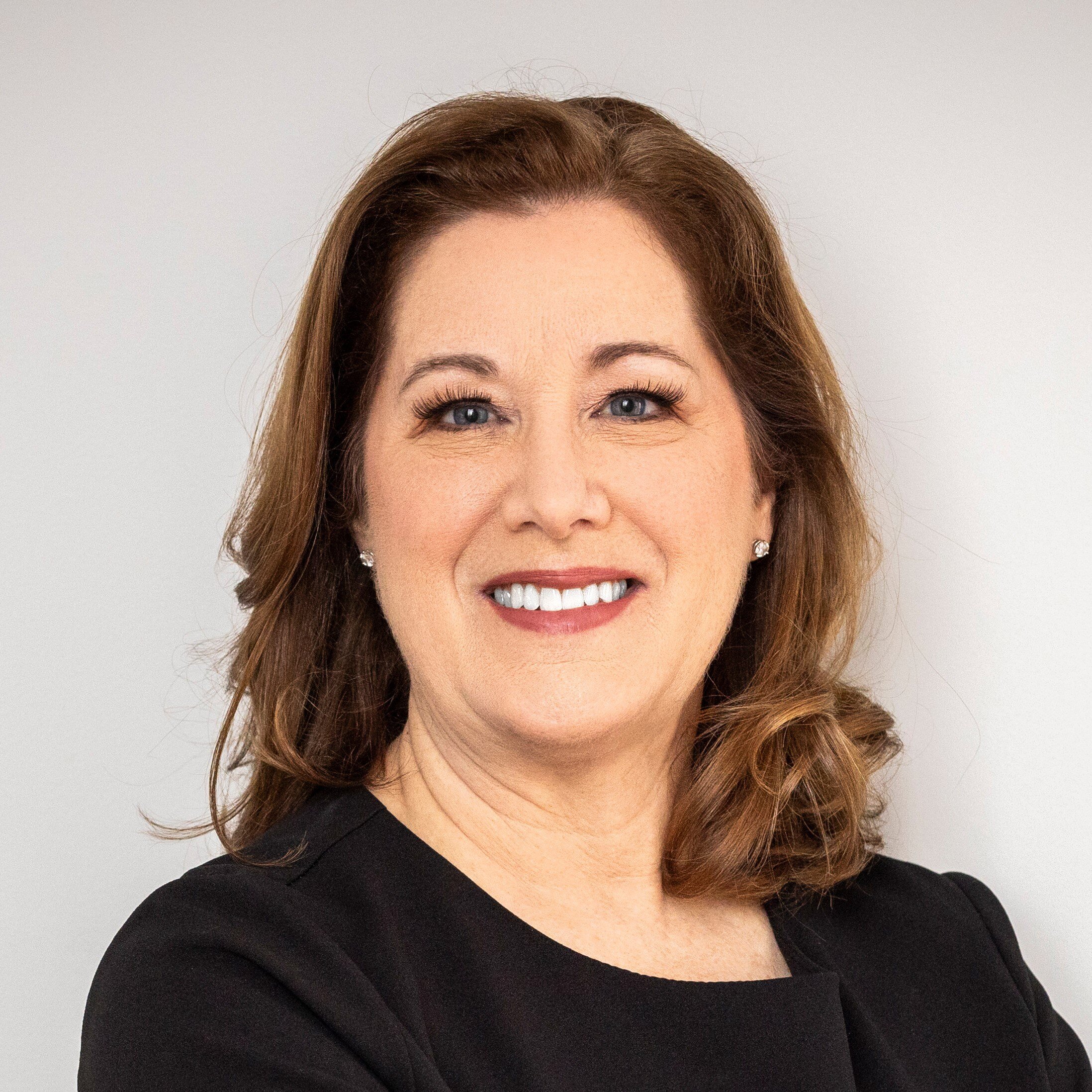
5 Mins
Updated: August 2, 2024
Published: January 17, 2023

Prosci’s Change Practitioner Journey Model shows how an individual achieves professional goals in change management. Although every journey is unique, we share a foundation and similar experiences that enable some common paths.
Context is critical for sense making. Prosci introduced the four-quadrant Change Practitioner Journey Model in 2019 to mitigate the potential confusion practitioners can feel after certification. Addressing “What I know,” “What I do,” “How I grow” and Where I go” helps you mentally organize Prosci content in the context of your chosen professional path.
4 Aspects of the Change Practitioner Journey
Prosci’s Change Practitioner Journey Model comprises four aspects—Models, Methodology, Practice and Path—and visualizes the process a person goes through to accomplish their career goals in the change management discipline.
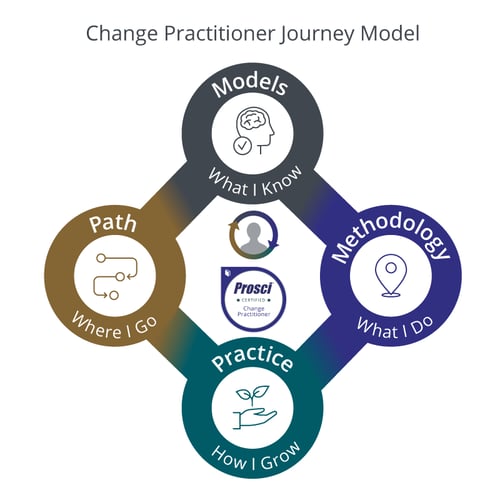
1. Models – What I Know
The first aspect of the Change Practitioner Journey Model is Models, which add context.
What I know: Foundational models and frameworks
“I can effectively apply Prosci Models.”
No matter your role or career goals, change practitioners need an understanding of foundational concepts in the discipline of change management. At a minimum, we must understand the context for change, the process of change, and the “why” behind change management.
At the most basic level, we know that change management is a process and not a switch. As an organization moves from the current state to a desired future state, individuals move through personal transitions at different rates. If we don't support, equip and enable people through the process, we can lose them along the way. The States of Change model illustrates this process.
States of Change
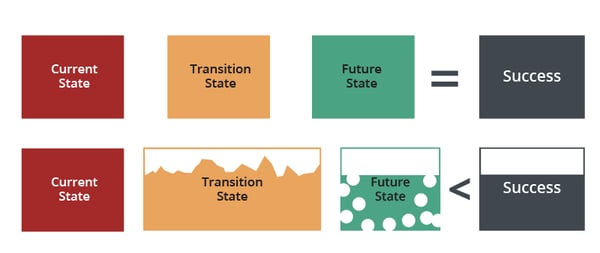 To make this transition successfully, an individual needs to progress through all the elements of the ADKAR Model—Awareness, Desire, Knowledge, Ability and Reinforcement. In the Prosci Methodology, ADKAR is integral to everything we do because organizational change is the collective result of all those individual changes.
To make this transition successfully, an individual needs to progress through all the elements of the ADKAR Model—Awareness, Desire, Knowledge, Ability and Reinforcement. In the Prosci Methodology, ADKAR is integral to everything we do because organizational change is the collective result of all those individual changes.
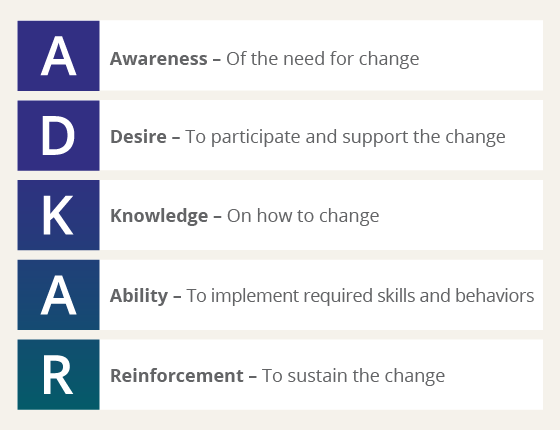
When we manage changes at the organizational level, the Unified Value Proposition helps us demonstrate to project leaders that change management and project management are complementary disciplines with a common goal of successful change. The model represents a high-level roadmap or “change management on a page” and helps change practitioners gain support for integrating the technical side and people side of change.
Unified Value Proposition
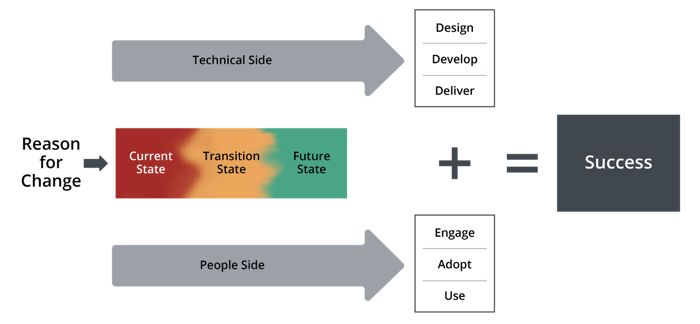
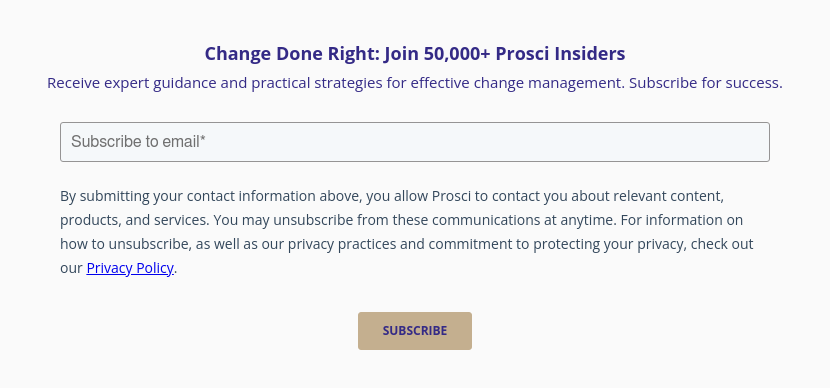
The Prosci Change Triangle (PCT) Model describes the four aspects of a successful initiative and how those aspects relate to one another. Using this model and supporting PCT Assessment equips change practitioners to proactively manage the health of projects, identify risks, and improve initiative outcomes.
Prosci Change Triangle (PCT) Model
Other models include the 10 Aspects of Change Impact, 4P’s, Risk, and Core Roles models.
2. Methodology – What I Do
Next, we progress to Methodology, which help us learn how to think about change and connect the activities to desired outcomes.
What I do: An approach to enable the people side of change to deliver results
“I can effectively apply the Prosci ADKAR Model, PCT Model, and 3-Phase Process.”
The Prosci Methodology is a structured, adaptable and repeatable approach to enable the people side of change and ultimately deliver results to the organization.

The Prosci Methodology is comprised of three primary components: the Prosci ADKAR Model, Prosci Change Triangle Model, and Prosci 3-Phase Process. The methodology is supported by additional models, processes, digital tools, research and resources.
The Prosci 3-Phase Process is a structured, repeatable approach for managing the people side of change, and provides the critical link between individual and organizational change. Instead of using a checklist of activities, the process enables an inquiry-based approach. We ask plain language questions and use the responses to determine what we need to do next.
The Prosci 3-Phase Process gives you the cues and capability to ask the right questions and then match up ADKAR with organizational activities that drive the necessary outcomes. The result is a scalable change management process that bridges the gap between individual and organizational change.
Prosci 3-Phase Process and Plain Language Questions
.png?width=800&height=568&name=3-phase-process-with-plain-language-questions%20(1).png)
3. Practice – How I Grow
If you only go through the process of learning change management, you can acquire “What I Know” and “What I Do.” But improving your practice requires growing your ability to gain commitment to change management, measure and achieve change performance, enable change management role fulfillment, achieve individual adoption and usage, and achieve organizational outcomes.
How I grow: Commitment to applying the methodology to grow change management skills
“I grow and advance my capabilities through practice.”
How can you grow your skills, expertise and overall practice?
Hands-on work
When you get into the real world with real projects, you start to learn all the nuances of managing change that you can’t simply learn and do. This level of understanding comes from doing the work and building experience. For example, to be effective with iterative or Agile changes, you have to go out and test and try the approaches, and eventually build the competency.
Change management communities
Working in communities, such as trade associations and your organization’s community of practice, also feeds and grows your practice. The Association of Change Management Professionals (ACMP™) offers conferences that advance your practice. Prosci Certified Change Practitioners connect through a members-only LinkedIn community to ask questions, brainstorm ideas and solve problems. These communities are a source of insights, camaraderie and professional growth.
Training and self-directed learning
When you train to become a Prosci Certified Change Practitioner, you earn the credential along with access to the Prosci Hub Solution Suite, including the Proxima web application, which guides you through the Prosci Methodology and enhances your application of change management over time. The digital tools also include built-in tips and research prompts that engage you in your practice and challenge you to add depth where it can have a meaningful impact.
When you are newer to change management, it’s helpful to take smaller steps at first and focus on what lies immediately ahead. We recommend starting on a smaller project with less complexity and lower risk, so you can build comfort with applying the fundamentals. This also creates the opportunity for you to achieve a project win for your organization and demonstrate your skills to peers and leaders. Although the fundamentals will always serve you well, you may find over time that you need to lean into advanced applications with deeper learning experiences, so you can tackle the complexities of large-scale, high-risk, high-return projects.
Even with formal training and participating in communities, self-directed learning is essential to your ongoing development as a change practitioner, which is why the Prosci resource center shares a wealth of free content such as on-demand webinars, eBooks, worksheets, success stories, research summaries, articles and blogs from thought leaders in change management. Change-enabling books, YouTube videos, and podcasts are also great ways to increase your professional awareness and gain new skills.
Teaching others
Experience is the best teacher. Training others in change management will deepen your knowledge and ability while reinforcing what you know about results and how change happens. You can often learn far more from teaching than other learning experiences because you must be equipped to answer questions, support concepts with contextual examples, and explain the change management models, methodologies and applications in clear and actionable ways.
Coaching and mentoring others fuels your professional growth through more informal engagement. It requires you to put yourself in the learner’s shoes, check your assumptions about what you know to be true, extrapolate from other experiences, and challenge yourself to learn more about change management to support your learner’s unique needs.
4. Path – Where I Go
The final aspect of the Change Practitioner Journey Model is unique to you, the individual change practitioner. Where you go on your career path depends on your personal and professional goals, and the jobs to be done:
“I want to inform and influence change success in my organization.”
This is about helping people develop the mindset and beliefs, common language, and understanding of the ADKAR Model during change. The desired outcome is to achieve commitment from leaders and project teams for addressing the people side of change and equipping them with an understanding of the model and process for individual change.
“I want to lead and deliver project success.”
To achieve this type of change success, you must ensure that actions and behaviors align with roles, models and methodology. The desired outcome is to deliver intended results on projects and initiatives through individual change while aligning with organizational strategy and operational execution.
“I want to inspire and develop change capability in my organization.”
Building change capability involves leading teams of change leaders and practitioners, and guiding and developing a change-ready culture. It also requires developing and deploying the enterprise change management (ECM) strategy in key areas: leadership, project, skill, structure and process. The desired outcome is to embed change capabilities across the enterprise, and within its people and culture.
Prosci ECM Framework With 5 Capability Areas
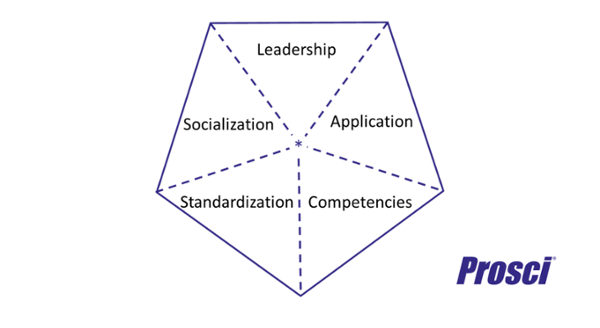
Prosci Change Management Journeys
People in change management come from different backgrounds and disciplines, and can follow many paths to success. The Prosci Change Practitioner Journey Model helps you find the best way to achieve your professional goals while meeting the strategic needs of your organization. No matter your journey, we are all united around our dedication to the people side of change.


